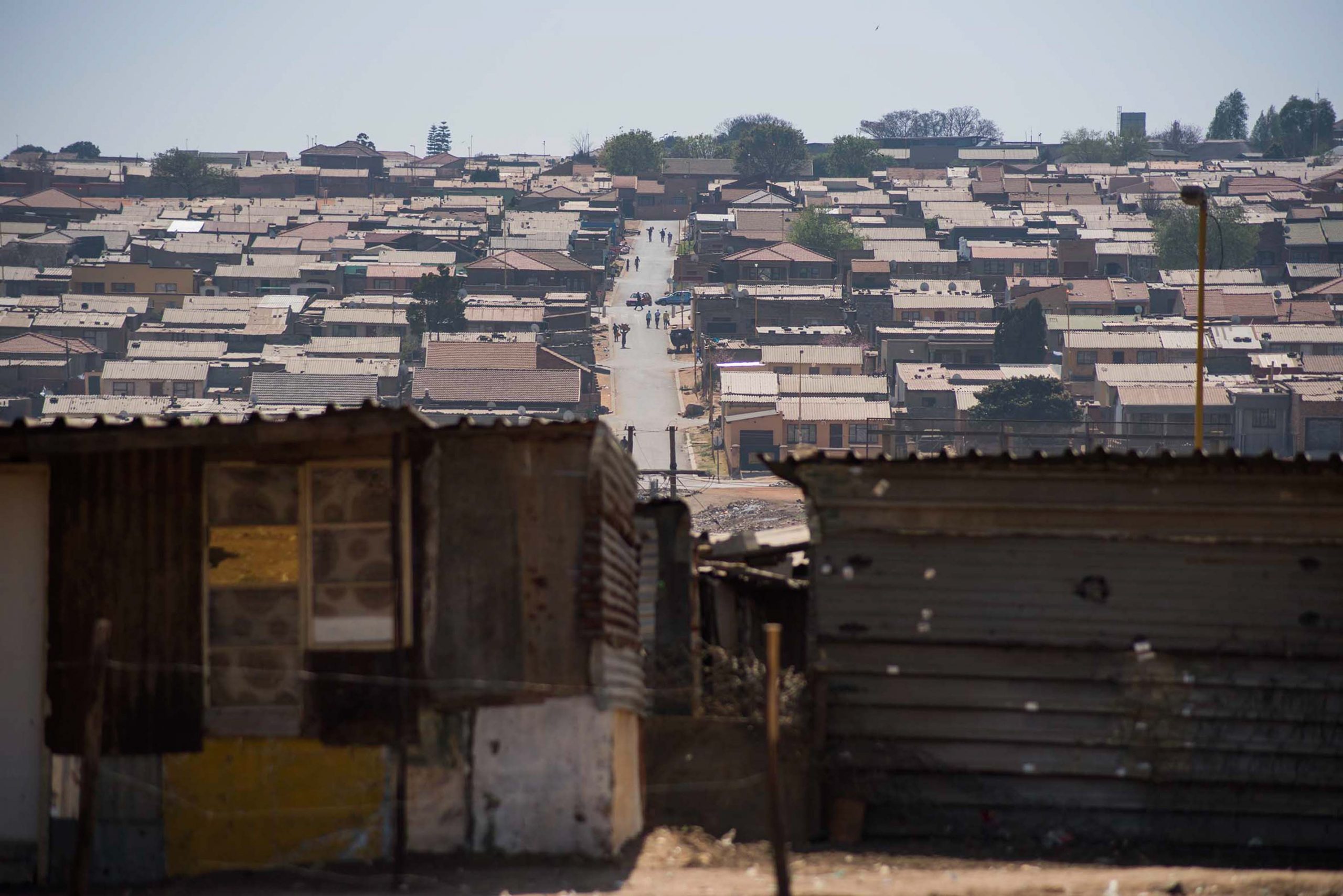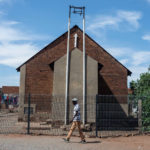Reblocking contested in Ekurhuleni
Touted as a solution for shack settlements, reblocking, according to critics, is impractical and leaves little room for grassroots urban planning.
Author:
26 November 2018

After a devastating fire that devoured at least 1 200 shacks in Cape Town’s Joe Slovo shack settlement in 2000, the environmental affairs department partnered with the Western Cape provincial government to roll out the process of “reblocking” to mitigate the danger of shack fires. This was a pilot project in a bigger process aimed at upgrading the Joe Slovo settlement.
The reblocking process aims to re-order shacks into standard sizes arranged into blocks, with roads that can be easily traversed by vehicles. In South Africa it has been strongly supported by Slum Dwellers International (SDI), a non-governmental organisation that has enjoyed enthusiastic support from the South African government and the World Bank.
The upgrade of the Joe Slovo settlement, a flagship programme for Lindiwe Sisulu when she was housing minister, resulted in intense popular contestation and is now widely considered to have been a failure.
Related article:
Reblocking promises many benefits at low costs with minimal disruptions. Advocates for reblocking argue that it allows for services such as paved access roads, storm water drainage, plumbing and electricity to be made more easily available. In addition, it is argued that reblocking reduces the risk of fires.
But critics argue that it is often implemented in an an overly standardised, top-down and authoritarian way that is imposed without regard to existing urban forms designed via grass-roots urban planning.
The reblocking process has often been been met with resistance. One recent example of this has been in Vusimuzi, Ekurhuleni, east of Johannesburg. A dense settlement once lined with six-room shacks, Vusimuzi is now a sad sight with old carpet patches, uprooted trees and cracked tiles still clinging on to the “main road”.

Demolished homes
Beginning in January this year shacks were demolished and residents were moved to make way for people relocated from neighbouring blocks in the community.
Demolitions often happened while people were at work and they were not given the opportunity to move their belongings before their homes were demolished.
Cynthia Nxumalo told New Frame she lost her job as a domestic worker in Van Riebeeck Park, Kempton Park, as a result of her angst around reblocking. “I wanted to know what was happening with my house. Things would get lost, stolen or damaged while they are demolishing and moving things, so when I saw the big CAT trucks, I would stay at home,” she says, sitting inside her shack on what used to be her stoep.
Vusimuzi ward committee chair Mkatshwa Zephania told New Frame that reblocking has stripped many people of the lives that they had built for themselves over the past 23 years while waiting for housing and services from the government.
“We have been here for 23 years, and we have not seen a developer here. They must give us decent sizes of land … let it be a home and not this squashed thing they want us to call home,” he says.

Spatial reconfiguration
While reblocking is often claimed as a progressive intervention, some community members in Vusimuzi say reblocking is regressive and not in their interests.
The process has often been marred with allegations of corruption and indignity, as community members say they are excluded from participation in a process that is imposed in an authoritarian manner.
The spatial reconfiguration requires community members to take down or give up parts of their shacks or move to another place. The few who usually do are unhappy because their lives are disrupted.
As a result of resistance from community members, reblocking has been temporarily suspended in the area until authorities are able to ascertain whether the community wants reblocking to be reintroduced.
Themba Gadebe, the spokesperson for the City of Ekurhuleni, told New Frame that the municipality has been engaged in ongoing talks to determine how the community feels about the process.
Initially, the municipality aimed to realign 8 257 structures, but only 200 out of 500 initially set aside have been realigned due to the community members’ grievances. Some community members say they are happy about the decision to halt the process indefinitely, but their relief does not undo the months of damage done to their and property.
Many residents complained that they were not aware of what the process would entail or that the demolition of the shacks would be so brutal and erratic. They claim to have been at the receiving end of threats and intimidation by various authorities.

‘Duped’
Dressed in a faded pink and white nightdress and a brown doek, Nxumalo says she has no gate and is stuck between two houses. According to her, reblocking does not address the needs of the community. The “streets” in the settlement are riddled with multicoloured electricity cables. Most residents use self-organised electricity connections. Nxumalo adds that they were duped by the promise of free electricity.
Phineas Moloi, a resident and Abahlali baseMjondolo member, agrees. “Our problem here is that we don’t have electricity, so when they first came and told us about this reblocking, they promised us electricity and water as part of development, and most of us agreed. We had heard that in areas like Two Line [Tembisa], they rejected the idea when they saw that the shacks were going to be smaller than what they had already built,” he says.
Moloi alleges that those for reblocking either used to be tenants who now have a chance to have their own stands, are employed by the construction company to do manual labour and will not be paid if construction comes to a halt, or are bribed with food parcels.

One size for all
Some residents lamented the fact that they had to reduce their yard and shack sizes to accommodate the addition of new shacks in their spaces.
According to Gadebe, stand sizes are standardised to cater for all occupants to prevent overflows. He says shacks cannot be bigger than the apportioned size of 10m x 12m, meaning those who have upgraded their shacks to accommodate new family members have to reduce their shacks and cram into smaller shacks. This is difficult for people who live with their children and grandchildren.
But Gadebe says no exceptions can be made. “There is currently no land available to cater for such within the vicinity of the area. Therefore, occupants that had allocated themselves bigger portions are urged to accept the standard size,” he says.
Sitting in a fly-infested shack, Sibongile Mpanza explains that after her shack was demolished in another section, she was relocated to this shack, which is on top of a pit toilet. “The first time it rained, there were worms everywhere. Now, as you can see, we used sand, carpets and cardboard to cover up the old pit toilets,” says Noxolo Shabalala, 29, as we enter Mpanza’s shack.
Inside the shack, Mpanza points at some holes in the corrugated iron roof. “That’s where the rain came in … I realised we were situated right on top of what used to be a pit toilet,” says Mpanza, 46, watching her three-year-old son grandson sleeping on the bed.
Mpanza’s neighbour, Lindiwe Ngcukana, says they had to move their shacks forward and out of the way of the pit toilets, cramping their matchbox shacks even further as they move into the territory of adjacent shacks.
Mpanza says a high-ranking Ekurhuleni official told them she was unable to help them move their shacks as long as reblocking had been halted. The official allegedly told them to appeal to Abahlali baseMjondolo to allow the process to be rolled out again.
Shabalala, who is a community leader, says the suspension is not a sign of victory for them, but they have hope that reblocking will not be rolled out any more. “Only once they have completely stopped it, will we be happy because now if they are still talking, that means they can continue with it at any time … just not as a forced effort, I think they can tell that people don’t want it,” she says, adding that it was also rejected in another part of Ward 90.
While talk of reintroducing reblocking in Vusimuzi continues, residents will only be at peace if there is a participatory process to ensure a speedy rollout of services.

